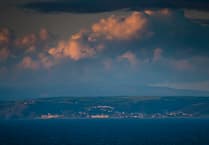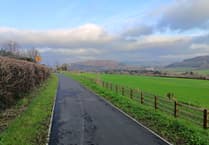A nature garden has been opened for residents at a sheltered housing complex in Trefechan, Aberystwyth.
Gerddi’r Ffynnon is a three-storey block of 30 flats, owned and managed by Wales & West Housing.
It has a communal garden, largely comprised of steeply sloping ground behind a retaining wall, plus a relatively small area of flat ground surrounding the building.
Last year Rhiannon Ling, a community development officer at WWH approached Rachel Auckland, co-ordinator of Ceredigion Local Nature Partnership, with a proposal for a garden restoration project.
Hefin Jones, asset management officer for WWH, prepared a sketch plan to build more raised beds, and presented this to the residents’ social club.
Using Welsh Government funding provided through the Local Places for Nature scheme, Rachel was able to bring in Gail Robinson, a garden designer from My Garden Paradise.
Gail talked to residents at their weekly coffee morning and drew up a plan to create raised beds of different shapes and sizes to meet the diverse access needs of residents who use a range of mobility aids.
The garden was opened on Saturday, 17 June, by Cllr Keith Henson, Ceredigion County Council’s Cabinet member for highways and environmental services and carbon management.
He said: “What a privilege to open the Gerddi’r Ffynnon gardens, planned and sown and grown by the residents and friends of the flats.
“It’s great to see Wales & West Housing help residents achieve their aims for the garden through support from the Ceredigion Local Nature Partnership.”
Rachel added: “It’s lovely to see how a nature-based gardening project of this kind can bring so many benefits both to wildlife and to our communities.
“This project has been a great learning experience for everyone involved.”
Rhiannon said: “This project has already achieved so much.
“It has brought the residents of Gerddi’r Ffynnon together as a community whilst designing and developing the garden.
“They are so proud of what they have achieved and so they should be.
The Local Places for Nature scheme supports nature recovery on a local scale by improving biodiversity while bringing benefits to deprived communities.




